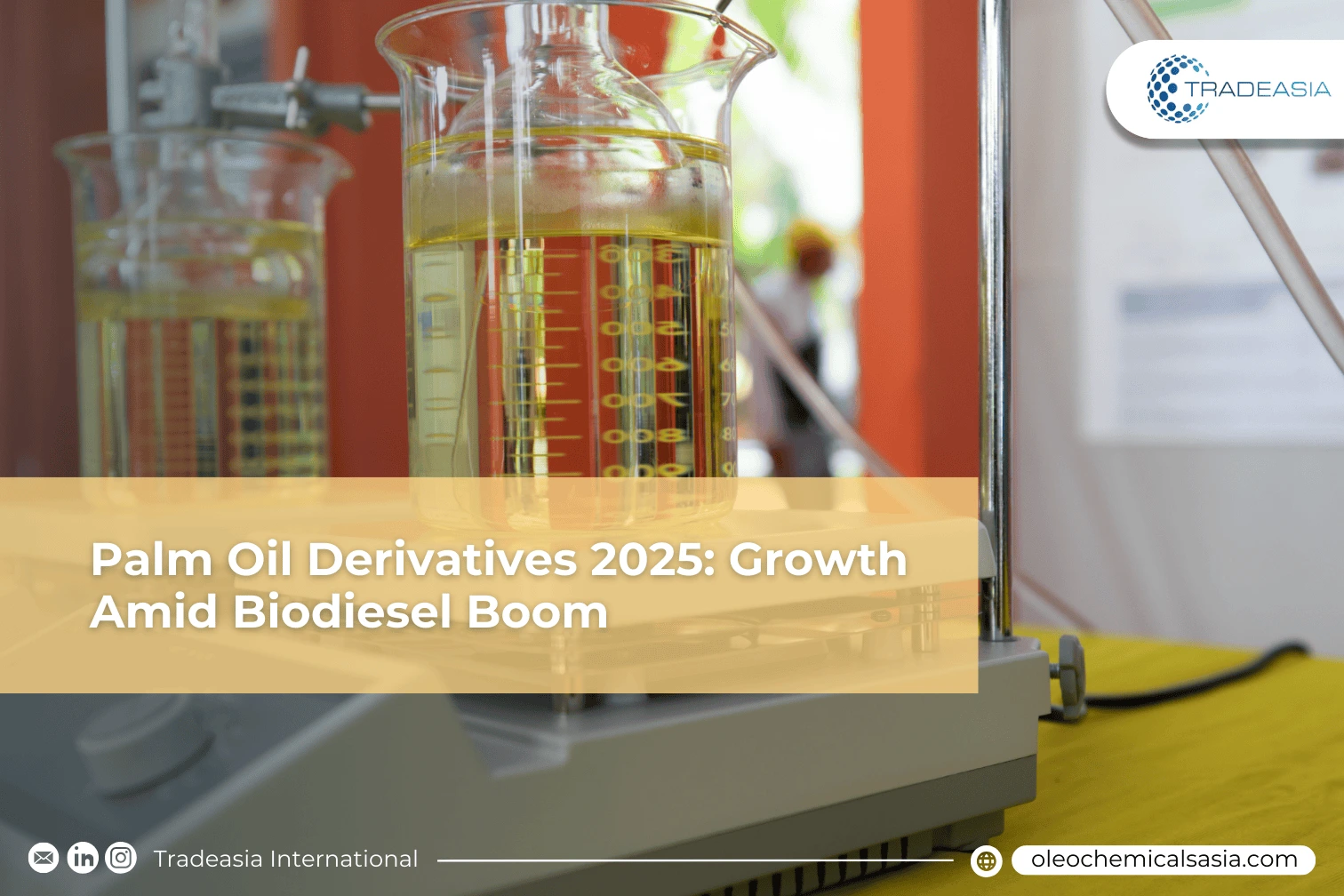How can we assist you?
Explore our network of country and industry based websites to access localized information, product offerings, and business services across our group.

Access reliable chemical market information through our update channels.
Real-time Updates
Daily Updates
Log in to start sending quotation requests for any product.
Don't have an account? Sign Up Here
Home Palm Oil Derivatives Market in 2025: Navigating Growth Amid Biodiesel Surge
Trade Insights | Regulatory and Compliance | 04 September 2025
Oleochemicals

Indonesia's Policy Shift: Driving Local Demand and Global Ripples
Regional Dominance and Strategic Supply Management
The palm oil derivatives market is experiencing remarkable momentum in September 2025, fueled primarily by expanding demand from the biodiesel sector. With an estimated valuation of $50 billion, the market is growing steadily, supported not only by traditional applications in food and cosmetics but also by the global push toward renewable energy. Companies engaged in trading and refining are increasingly looking to integrate sustainable sourcing strategies, ensuring they remain competitive in this dynamic landscape. In this context, partners like Tradeasia International have emerged as key facilitators, providing reliable palm oil and oleochemical supply solutions for businesses navigating these evolving market dynamics. As one industry trader notes, “Having a trusted sourcing partner can make all the difference in a volatile market.”
Indonesia, the world’s largest palm oil producer, plays a pivotal role in shaping market trends. The B40 biodiesel mandate, which requires fuels to contain 40% palm oil–based biodiesel, is projected to drive domestic consumption to 16 million kiloliters (KL) in 2025, up from 13 million KL in 2024. Looking ahead, the government aims to implement a B50 program, potentially pushing demand to 18 million metric tons of crude palm oil from 14.2 million metric tons under B40. This ambitious policy framework is among the most aggressive globally, underscoring Indonesia’s strategic influence on biofuel markets. The cascading effect on trading is significant: with more raw material diverted to local production, export volumes tighten, compelling market participants to optimize supply chains and logistics. Crude palm oil prices reflect this pressure, with futures expected to remain above 5,000 ringgit/ton ($1,130/ton) in early 2025, highlighting the balance between robust demand and constrained supply.
Beyond Indonesia, Southeast Asia—particularly Malaysia—continues to shape production and consumption patterns in the palm derivatives space. Rising biofuel commitments in North America and Europe further reinforce the global reliance on imported palm derivatives, prompting suppliers to prioritize sustainability and certification. Companies now face the dual challenge of meeting escalating demand while adhering to environmental standards, compelling them to adopt more sophisticated supply chain strategies. Tradeasia International’s expertise in palm and oleochemical trading illustrates how strategic partnerships can streamline sourcing, ensuring both compliance and efficiency. As industry insiders often emphasize, “Navigating global demand requires not just volume, but reliability and sustainability in supply.”
In conclusion, 2025 marks a critical period for the palm oil derivatives market. Robust biodiesel-driven demand, coupled with Indonesia’s B40 and upcoming B50 mandates, continues to tighten supply and support prices. Companies equipped with strategic supply chain approaches and trusted partners like Tradeasia International are well-positioned to capitalize on this evolving frontier, balancing profitability with sustainable growth.
Sources:
Oleochemicals Asia - Market information and insights related to palm oil derivatives and biodiesel sector - https://www.oleochemicalsasia.com/
Argus Media - Biodiesel to drive 2025 palm oil prices, including Indonesia's B40 mandate and market impacts - https://www.argusmedia.com/en/news-and-insights/latest-market-news/2626828-biodiesel-to-drive-2025-palm-oil-prices-ipoc
Reuters - Analysis on palm oil production, biodiesel demand surge, and regional market pricing - https://www.reuters.com/markets/commodities/end-cheap-palm-oil-output-stalls-biodiesel-demand-surges-2025-03-09/
We're committed to your privacy. Tradeasia uses the information you provide to us to contact you about our relevant content, products, and services. For more information, check out our privacy policy.
How can we assist you?
